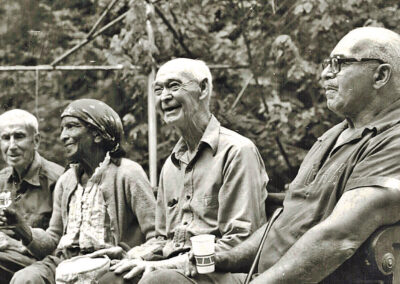Gipsy Grounds
In Vermont, sociologists now recognize that the term “gipsy” was often applied to the indigenous Abenaki peoples, and their kin, some of whom adopted an itinerant peddler version of their annual subsistence cycles. In the nineteenth century, a local physician-cum-cartographer, Charles William Grau created a map of Brattleboro, noting an area off what is today Cedar Street as the “Gipsy Grounds.” [sic]
Grau’s “Gipsy” moniker was miss-applied, but about the deep history of this place he was not wrong.
A Land Acknowledgement
Like every place in the United States, Brattleboro was built on stolen land, and the European settlers who came here during the colonial period did everything they could to drive out the Indigenous people who lived here. Those people are the Sokoki Abenaki (or, translated into English from the original Sokwakiak, the People Who Separated), and despite centuries of persecution they survive today. Their native tongue, Aln8ba8dwaw8gan—the Western Abenaki language—survives as well, but is greatly endangered. To the Sokoki Abenaki, this place is known as Wantastegok, the Place of the River Where Things Are Lost, referring to the confluence of Kwenitekw with Wantastekw, what we now call the Connecticut River and the West River. Every corner of this land holds their stories. This research site on the Brattleboro Words Trail documents the history and enduring presence of the Sokoki Abenaki and their homeland, Wantastegok.
Indigenous Peoples
The Hill Before Harris
Listen to an audio story on the Gipsy Grounds produced for the Brattleboro Words Trail.
Gipsy Grounds
10,000 BCE
Our Story
If the misapprehended Abenaki were in fact Dr. Grau’s, “Gipsies,” – and we know they were – then the misapplied moniker nevertheless hints at a truth within the Gipsy Grounds even deeper than Dr. Grau would ever imagine.
The earliest European settlers understood lands around Brattleboro sheltered Abenaki homes and villages prior to the influx of European settlers into southern Vermont. But labeling the Abenaki presence on these lands as pre-contact fails to express the magnitude of that history and character of this place. The Abenaki presence in this area doesn’t just predate European settlers, it predates western civilization. By a lot.
As civic ideas started to slowly form in the ancient middle east, the Abenaki’s ancestors had already been living throughout this area for over 5,000 years. It is perhaps fitting that ancient peoples would seek and find safety and sustenance in the shadow of a formation old even by geologic standards. Today, upon the erstwhile Gipsy Grounds, we find a cornfield that is commandeered by cars to form a parking lot for two days each winter. And atop the Abenaki’s four-hundred-million year old outcropping of windward protection, rests Fred Harris’ ski jump, Harris Hill.
About the Research sites
The Brattleboro Words Project is working with the community to identify specific sites and themes significant to the study of words in Brattleboro and surrounding towns. Research Teams – classrooms/teachers, amateur historians, veterans, writers, artists and other community members — will produce audio segments and other work to be incorporated into audio walking, biking and driving tours tours.

